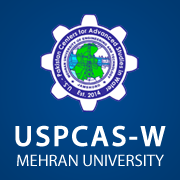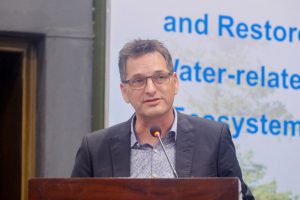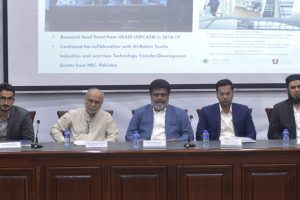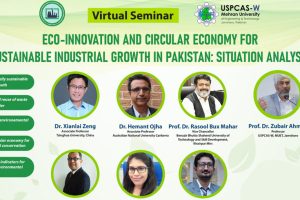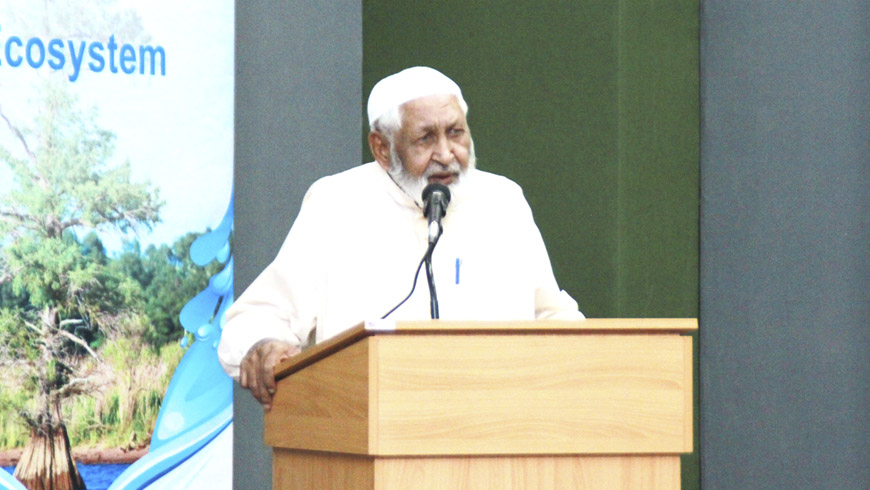
Muhammad Naveed Iftikhar, Nazir Ahmed Watto and Dr. Rasool Bux Mahar speaking in the seminar at USPCAS-W Mehran University Jamshoro
Muhammad Naveed Iftikhar, Public Policy Advisor, and Researcher said that beginning of urban life was started in 8000 B.C. and in 2010 the 50% population is urban which is 3.5 billion, the 21st Century , experts call it urban century, will add 5 billion in worlds urban populations and in 2060 it will be 7 billion. This, he said while delivering a lecture on Community-Government Partnership for Metered Drinking Water: A Case Study of Bhalwal,Sargodha District of Pakistan at Lecture Theater of U.S.-Pakistan Center for Advanced Studies in Water (USPCAS-W) at Mehran University of Engineering and Technology (MUET) Jamshoro on Tuesday.
He said that in Pakistan the very little up-to-date research on the potential impact of climate change on water quality and the presentence of water-borne diseases is done so far. Mr. Iftikhar quoting the authors said that if cities are going to serve as engines of economic success, rather than places of sickness, crime, and despair, the world will need better urban policies. While sharing the presentation on the case study of Bhalwal where the Changa Pani (good water) Program (CPP), was initiated which provides metered clean and safe drinking water to the community of Bhalwal, he said that the model was running because of distribution of work, participatory planning, water meter, role of intermediary civil society organization, local community organization to operate and maintain the model. Mr. Nazir Ahmed Wattoo, Director of Anjuman Samaji Behbood (ASB), presented the introduction of ASB and its efforts for the provision of safe and clean drinking water to the community. While delivering a lecture on problems and solutions, Mr. Watoo said that Pakistan’s problem is the moral one, not an economic and consequently the misuse of the resources is one of the biggest problems in the country which is mostly misinterpreted as lack of the resources. He said that government is mostly focused on the conventional development whereas the solutions to the most of the problems lie in the participatory approach which comprising of internal and external development. Mr. Watto said that the mission of CPP is to provide affordable water and sanitation services of good quality with the partnership of Community, WASA, Civil Society, Government of Punjab. “Water measurement is water management”, Mr. Watoo added.
Dr. Tariq Banuri, Executive Director at Global Change Impact Studies Centre (GCISC) Islamabad and Professor at University of Utah, had interaction with the students of the Center. Dr. Banuri delivered a motivational speech on the career goals, community services, achieving Sustainable Development Goals (SDGs) and sustainable solutions to the water and climate change-related problems in Pakistan. Dr. Banuri also had a meeting with USPCAS-W management and faculty in which he discussed center’s governance, research projects, building logistics and climate change conference. Dr. Banuri also had an online meeting with Agency for Barani Area Development (ABAD) for the joint venture research projects initiated by the Center and ABAD.
Dr. Bakhshal Lashari, Project Director of the Center presented the souvenirs to the speakers and the guests. Dr. Rasool Bux Mahar, Deputy Director USPCAS-W, introduced the speakers and moderated the event. USPCAS-W students and faculty participated in the event.

